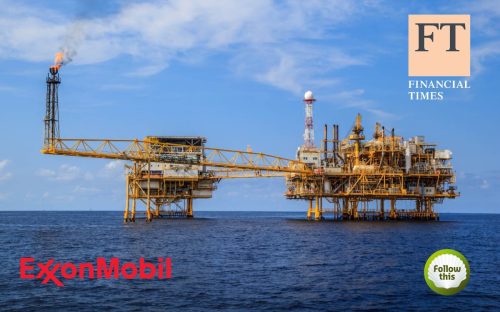The world’s largest asset manager has a key role in tackling the climate crisis but acts in opposition
INVESTOR AND MEDIA BRIEFING
“Climate risk is investment risk,” wrote Larry Fink, the CEO of BlackRock, in his annual letter to CEOs in 2020. He couldn’t be more right: failing to limit global warming will hurt the global economy, as floods, droughts, and hurricanes wreak havoc.
However, BlackRock votes against climate resolutions that requested oil and gas companies to reduce carbon emissions, effectively endorsing them to exacerbate the climate crisis.
Today, at BlackRock’s shareholder meeting, we call on CEO Larry Fink to retake his responsibility as steward of the global economy. He need only reread his own arguments to realise that it is his financial duty to his clients. After all, his customers have entrusted him with their assets, including billions of dollars in pension savings.

Portfolio risks
First, he should act to safeguard BlackRock’s portfolio; climate change poses a profound systemic risk to diversified portfolios, especially those managed by large, passive asset managers like BlackRock. Because these firms are ‘universal owners’, holding stakes across the entire economy, their portfolios are exposed to the aggregate risks of climate change. If climate change proceeds unchecked, this will result in huge portfolio-wide losses.
Universal owners cannot diversify away from climate risk; it affects all sectors and geographies, undermining the long-term value of their entire portfolio. This is why failing to support climate action at the world’s largest emitters is not just a passive oversight; it actively undermines the financial interests of clients whose assets are at risk from climate-driven economic shocks, regulatory changes, and physical damages.
Transition risks
Moreover, he should protect the future of fossil fuel companies in view of peak oil. The International Energy Agency (IEA) projects that global demand for oil and gas will shrink after 2029, marking a pivotal shift for the fossil fuel sector. Companies that do not adapt to this transition risk being left with stranded assets and declining valuations. BlackRock’s CEO warned in his 2021 letter that “there is no company whose business model won’t be profoundly affected by the transition to a net zero economy”.
For oil and gas companies, failing to plan for a low-carbon future means jeopardizing their long-term competitiveness and shareholder value. As the energy transition accelerates, those without credible transition strategies will lose the confidence of customers, policymakers, and shareholders, and lose value.
Voting is shareholders’ only leverage
Proxy voting at shareholders’ meetings is the primary mechanism by which shareholders, especially passive investors, can influence corporate behaviour.
Larry Fink himself has repeatedly emphasized the importance of using BlackRock’s “voice and vote” to drive the transition necessary to avoid catastrophic climate impacts. In 2020, he committed to “placing sustainability at the centre of our investment approach” and using proxy voting as a tool for change.
In Fink’s words: “I have only one power, and I’m going to use that power heavily, and that is the power of the vote.”
Walking the talk
In 2021, after years of rhetoric, BlackRock was briefly walking the walk, voting for most climate proposals, including five Follow This climate resolutions at BP, Chevron, Equinor, ConocoPhillips, and Phillips 66. In the US, supported by BlackRock’s vote, the resolutions reached majorities. Chevron and P66 responded by setting emissions reduction targets, notably including product emissions (Scope 3).
However, in 2022, BlackRock backtracked, voting against most shareholder resolutions requesting emissions reductions.
“Environmental police”
As an explanation for his retreat, Larry Fink suddenly rejects responsibility for “engineering a specific decarbonization outcome” by saying “I am not the environmental police”. This is a fallacy. A vote against emissions reductions shapes the pace and direction of decarbonization as much as a vote for.
Therefore, BlackRock cannot eschew responsibility for their impact on decarbonization; they wield decisive voting power. The firm must explain how it decides which voting direction best protects long-term client value and substantiate this with evidence, rather than defaulting to opposition.
“Overly prescriptive”
BlackRock also argues that many shareholder proposals have become too prescriptive and constrain management unduly. This is not the case for the Follow This climate resolutions, which are deliberately business model and technology agnostic, leaving the decisions to set and achieve the targets to the board.
Labelling these proposals as “overly prescriptive” masks a deeper unwillingness to press companies on the essential, financially material aspects of climate risk.
Alienating clients
Most institutional investors are clients of BlackRock. However, the reputational and financial risks from misalignment between their proxy votes and their clients’ stated climate preferences are growing. Clients are increasingly demanding that their capital be managed in alignment with their long-term interests, including climate risk mitigation.
BlackRock’s shift from championing climate action as a fiduciary imperative to opposing emissions reduction resolutions represents an abdication of their responsibility to protect clients’ long-term asset value.
With over ten trillion in assets, BlackRock holds the key to solving the climate crisis and has the most to lose. BlackRock’s assets are bigger than Big Oil’s. If Larry Fink acts like it, he can save the world.
QUESTION AT BLACKROCK’S AGM
In recent years BlackRock has walked back its assertion that companies and investors have a key role to play in the clean energy transition, as “climate risk is investment risk.”
Instead, BlackRock is taking the position that its role is not to “engineer a specific decarbonization outcome.” BlackRock’s significant stakes in investee companies and the sheer scale of their assets under management mean the firm’s decisions move markets and wield outsized influence.
The way BlackRock votes on shareholder resolutions or engages with companies will materially steer the pace and direction of decarbonization efforts. Yet, BlackRock continues to support fossil fuel companies and other players that are apparently seeking to engineer a specific non-decarbonization outcome.
A new report from the Union of Concerned Scientists underscores how fossil fuel companies continue to distort science and lobby against climate action, even as they plan to produce more oil and gas and abandon climate targets.
Given the extreme risks that runaway climate change poses to humanity and the economy, how can BlackRock square its fiduciary duty to its clients with continuing to support companies whose actions and investments are engineering such a negative outcome?










